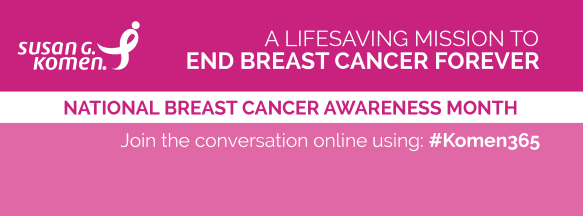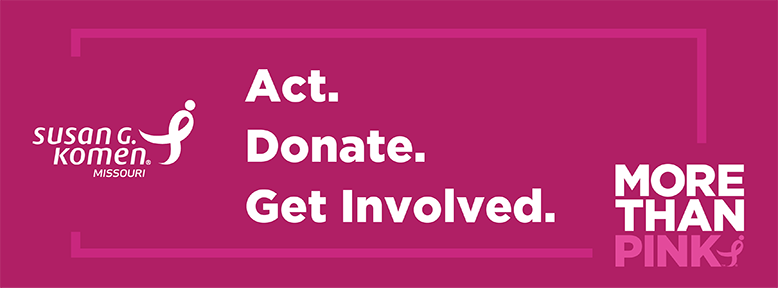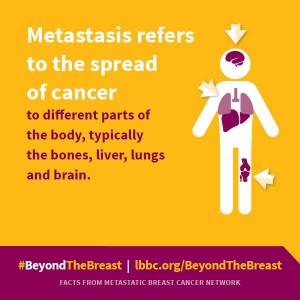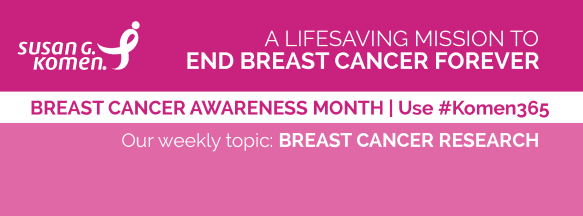Susan G. Komen® shared this statement regarding breast cancer screening:
World’s Largest Breast Cancer Organization Reiterates that Screening Should Be Based on Individual Risk and is Decision for Women and their Health Care Providers
DALLAS – Oct. 20, 2015 – The Susan G. Komen® breast cancer organization today said that all women should have access to regular mammograms when they and their health care providers decide that it is the right time for screening based on individual risk for breast cancer, and that the screening tests should be covered by third-party payers such as insurance companies and government programs.
Komen’s statement came following the release of new American Cancer Society (ACS) screening guidelines, published today in the Journal of the American Medical Association (JAMA). In the guidelines, ACS raised its recommended age for annual screening mammograms from 40 to 45 for women of average risk for breast cancer, with biennial mammography for women 55-74. The U.S. Preventive Services Task Force (USPSTF) also has drafted guidelines that would raise the recommended age for regular mammography to 50 for women of average risk.
“We have a great deal of respect for the ACS and the USPSTF, their expert committees and their thorough review of the scientific literature to inform the current guidelines. Although guidelines may differ regarding the age at which routine screening should begin, there is agreement that mammography is the best available tool for detecting breast cancer and that women and their health care providers should decide when those screenings should begin for individuals,” said Dr. Judy Salerno, President and CEO of Susan G. Komen.
Salerno said that the continuing debate over the timing of mammography fails to address several important issues.
“First, the medical field is moving toward determining individual needs for screening based on a woman’s risk, such as family history of breast cancer. Ultimately, women must have better and more accurate information about their individual risk for breast cancer so that they and their providers can make informed decisions about the screening schedule that is right for them. Knowledge is power,” she said. Information about breast cancer risk is available on komen.org.
“Second, it is estimated that about one-third of women who should be screened do not access these services. This means that we must take all steps necessary to ensure that women don’t face economic or other barriers when their health care providers recommend screening. It’s well established that early detection, combined with effective treatment, reduces mortality from breast cancer.”
“Third – and this is a point we’ve made often – we absolutely must continue to invest in finding screening methods that are more accurate, cost-effective, easy-to-administer, and more widely available than mammography,” Salerno said. Komen has invested more than $33 million to date into research to find better screening technology for breast cancer, such as blood and tissue tests.
The ACS recommendations are not binding on health care providers or payers, Salerno noted, “but we are concerned that they have the potential to lead to reduced accessibility to and coverage for health screenings from both private and public insurers.”
In addition to its new recommended screening ages, ACS said clinical breast exams – the manual palpation of the breast and axilla (underarm) by trained health care providers – are no longer necessary as they did not reduce mortality from breast cancer and because better screening tools, such as mammography, are available. Clinical breast exams are usually conducted during routine “well woman” doctor visits, often beginning when a woman is in her 20s.
“As a practical matter, clinical breast exams take very little time, are not invasive, and may be the only form of breast screening available, especially in rural areas and for younger women who are not at an age when regular mammography would be indicated,” Salerno said, adding that more information is needed on the efficacy of clinical breast exams.
Salerno said Komen and its scientific advisors will closely review the ACS recommendations, including mammography and clinical breast exams.
She acknowledged concerns about “overtreatment” for breast lesions or tumors that are found early but might not develop into cancer. “This is a real issue, but one that also requires education, so that women can have discussions with their health care providers about the course of cancer treatment that is right for them. And more research is needed to help determine which women may go on to have invasive cancer. A woman cannot make a decision about treatment, however, if she hasn’t been screened.”
Komen also is investing in research that would allow health care providers to accurately differentiate between breast lesions that will become cancerous, and those that won’t.
 The costs of breast cancer treatment can impose a significant financial burden on survivors. The Susan G. Komen® National Treatment Assistance Fund helps bridge the gap for individuals who are actively undergoing breast cancer treatment.
The costs of breast cancer treatment can impose a significant financial burden on survivors. The Susan G. Komen® National Treatment Assistance Fund helps bridge the gap for individuals who are actively undergoing breast cancer treatment.

